The Siberian Husky, a breed renowned for its striking appearance and resilient nature, has specific dietary needs essential for its health and well-being. Understanding how long a Husky can safely go without eating is crucial for any owner, as it touches on broader aspects of their care and nutrition. This article delves into the Husky’s unique dietary requirements, examining factors influencing their ability to withstand periods without food and the potential risks of fasting. By exploring how age, health, activity levels, and environmental conditions impact their eating habits, we aim to provide Husky owners with valuable insights into maintaining the health and vitality of their beloved pets.
How long can a husky go without eating?
Huskies, known for their resilience, can typically go without food for about 5 days, though this is not advisable. Their endurance largely depends on their health, age, and activity levels. Young, active, or health-compromised Huskies might struggle with short periods without food. It’s crucial to remember that while Huskies can survive for a few days without eating, this can lead to serious health issues. Always ensure regular feeding and consult a vet if your Husky refuses food for more than 24 hours, as it could indicate underlying health problems.
Importance Of Understanding A Husky’s Dietary Needs.
A Husky’s dietary needs are fundamental to responsible pet ownership, and its importance cannot be overstated. Here’s a more detailed exploration of why this knowledge is crucial:
The most immediate and significant reason to comprehend a Husky’s dietary needs is its direct impact on their health and overall well-being. Proper nutrition is the cornerstone of their physical and mental health. A well-balanced diet provides essential nutrients, vitamins, and minerals for their bodily functions, ensuring they are in peak condition.
Huskies are renowned for their boundless energy and endurance. Their diet fuels these characteristics, allowing them to engage in vigorous activities like running, hiking, or pulling sleds. Understanding their nutritional requirements ensures they have the energy reserves needed for these activities.
Maintaining an optimal weight is critical for a Husky’s health. Understanding their dietary needs helps prevent obesity, a common issue in this breed, which can lead to various health problems. Conversely, it prevents malnourishment, ensuring they receive the right calories to stay healthy.
Huskies have a distinctive double coat that requires proper nutrition to stay healthy. Their diet significantly affects the condition of their coat, including its shine and thickness. Adequate nutrition minimizes shedding and skin issues, contributing to their overall comfort.
Like all dogs, Huskies can suffer from digestive problems. Understanding their dietary needs can help prevent food allergies, sensitivities, and gastrointestinal disorders. It allows owners to select gentle foods for their Husky’s stomach.
Proper nutrition has a direct impact on a Husky’s lifespan. A well-balanced diet reduces the risk of diet-related illnesses, including heart disease, diabetes, and certain types of cancer. Owners can help their Huskies enjoy a longer and healthier life by providing the proper nutrients.
Diet plays a role in a Husky’s behavior and temperament. Nutrient-rich food supports cognitive function and emotional well-being. A well-fed dog is likelier to exhibit good behavior, have a balanced temperament, and be more accessible to train.
Knowing a Husky’s dietary needs extends to understanding how long they can go without food safely. This is particularly important in emergencies or situations where food is unavailable. Owners aware of their Husky’s fasting capabilities can take appropriate measures to ensure their pet’s health during such times.
Understanding dietary needs allows for early detection of nutritional deficiencies or excesses. Regular monitoring of a Husky’s diet enables owners to promptly identify and address any issues, preventing potential health problems.
What Factors Influence A Husky’s Ability To Go Without Food?
Several factors can influence a Husky’s ability to go without food, each playing a role in how the dog handles periods of fasting:
Age: Age is crucial in a Husky’s ability to fast. Puppies, in particular, have high energy requirements due to their growth and development. They have less body fat reserves, making them more susceptible to fasting’s adverse effects. On the other hand, senior Huskies may have reduced energy needs but can be more sensitive to fasting due to age-related health issues. Therefore, age-specific dietary considerations are essential.
Health: The overall health of a Husky is a significant determinant. Healthy Huskies are generally more resilient to fasting, as their bodies can better cope with periods without food. However, Huskies with preexisting health conditions, such as diabetes, gastrointestinal problems, or metabolic disorders, may struggle with fasting and require more consistent feeding schedules to manage their conditions.
Activity Level: Huskies are known for their high energy levels and love for physical activity. Active Huskies burn more calories and require a consistent source of energy. As such, highly active Huskies may find it more challenging to go without food for extended periods without experiencing a noticeable drop in their energy levels.
Body Condition: A Husky’s body condition, precisely their body fat percentage, can significantly impact their ability to fast. Huskies with higher body fat stores have more reserves to draw upon during fasting, making it easier to endure periods without food. Conversely, Huskies with lower body fat percentages may be more vulnerable to fasting’s adverse effects.
Environmental Factors: The environment in which a Husky lives can influence their ability to go without food. In cold climates, Huskies must expend more energy to maintain their body temperature. This increased energy expenditure can make fasting riskier in such conditions, as they may struggle to stay warm without a sufficient caloric intake.
Stress Levels: Stress can significantly impact a Husky’s appetite and ability to fast comfortably. High-stress levels, often resulting from changes in their environment, routine, or exposure to unfamiliar situations, can lead to reduced food intake or even complete food refusal. Managing stress and providing a stable environment is essential for a Husky’s well-being.
Dietary Habits: A Husky’s past dietary habits can influence their ability to adapt to fasting. Dogs accustomed to regular feeding schedules may find it more challenging to skip meals, while those with irregular eating patterns might be more accustomed to occasional fasting. Consistency in feeding routines can help Huskies adapt to fasting if necessary.
Hydration: While not directly related to food, proper hydration is crucial for a Husky’s overall well-being. Dehydration can exacerbate the adverse effects of fasting, so ensuring that a Husky has access to clean and fresh water is essential during periods of reduced food intake.
Individual Variations: It’s important to recognize that each Husky is unique, and their ability to go without food can vary based on individual genetics and past experiences. Some Huskies may naturally tolerate fasting better than others. Observing your specific Husky’s response to fasting can provide valuable insights into their unique needs and preferences.
The Risks Of Fasting In Huskies
Nutritional Deficiencies: Fasting, or prolonged periods without adequate food, can lead to significant nutritional deficiencies in Huskies. These deficiencies can result from a lack of essential nutrients, including vitamins, minerals, and proteins. Over time, these deficiencies can manifest as health issues, such as a dull coat, brittle nails, impaired bone development, and a weakened immune system. To prevent these problems, providing a well-balanced diet that meets the Husky’s nutritional requirements is crucial.
Weight Loss:
Extended fasting can lead to rapid and potentially unhealthy weight loss in Huskies. This is especially concerning for dogs that are already on the lean side. Excessive weight loss can compromise their overall health and energy levels, making them more vulnerable to illnesses and reducing their physical endurance.
Hypoglycemia:
Huskies are known for their high energy levels and active lifestyles. When they fast, their blood sugar levels can drop, leading to a condition called hypoglycemia. Hypoglycemia can result in weakness, lethargy, disorientation, and, in severe cases, seizures. Maintaining a regular feeding schedule helps stabilize their blood sugar levels.
Muscle Loss:
Prolonged fasting, known as catabolism, can force the body to break down muscle tissue for energy. This can lead to muscle wasting and decreased overall strength and endurance. Maintaining proper nutrition is essential to preserve muscle mass.
Digestive Issues:
Huskies subjected to irregular feeding schedules may experience digestive problems when they eat. Their digestive systems can become sensitive to sudden changes in diet, leading to issues like vomiting, diarrhea, and indigestion.
Behavioral Changes:
Hunger can trigger significant behavioral changes in Huskies. They may become irritable, anxious, restless, or even aggressive when not fed regularly. These behavioral changes can be challenging and impact the dog’s well-being.
Liver Health:
Extended fasting stresses the liver as it tries to produce glucose to meet the dog’s energy needs. Over time, this can lead to liver strain and potential long-term implications for liver health. A consistent diet helps maintain the health of vital organs.
Weakened Immune System:
Nutritional deficiencies resulting from fasting can weaken the Husky’s immune system. A weakened immune system makes them more susceptible to infectious illnesses and slower injury recovery.
Dehydration:
If a Husky refuses to eat for an extended period, they may also refuse to drink water. Dehydration can set in quickly, leading to a range of health problems. It’s crucial to monitor their water intake and provide access to clean, fresh water at all times.
Mental Stress:
Fasting can cause significant stress and anxiety in Huskies. The persistent feeling of hunger can lead to restlessness, excessive vocalization (barking), destructive behavior, and even depression. Maintaining a regular feeding routine contributes to their mental well-being.
Tips For Encouraging A Husky To Eat Regularly.
Encouraging a Husky to eat regularly can improve their health and well-being. Here are some tips to help improve their appetite and ensure they maintain a consistent eating schedule:
- Establish a Routine: Dogs, including Huskies, thrive on routine. Set a consistent feeding schedule, ideally with two meals per day. Offering meals simultaneously daily helps create a sense of predictability for your Husky.
- Choose High-Quality Dog Food: The foundation of a healthy diet is high-quality dog food. Look for brands that list real meat, such as chicken or beef, as the primary ingredient. Avoid foods with excessive fillers like corn, wheat, and soy.
- Mix Wet and Dry Food: If your Husky hesitates to eat dry kibble, consider mixing a small amount of wet dog food. The added moisture and flavor can make the meal more appealing. Ensure that the wet food complements their nutritional needs.
- Opt for Home Cooking: Some Husky owners prefer to prepare homemade meals for their dogs. If you choose this route, consult a veterinarian or canine nutritionist to ensure the diet is balanced and meets their requirements.
- Warm Their Food: Gently warm your Husky’s food in the microwave for a few seconds to enhance the aroma. Dogs are often more attracted to warm food. Ensure it’s not too hot to avoid burns.
- Add Tasty Toppers: Sprinkle a small amount of dog-friendly toppers on their food, such as shredded cheese, low-sodium broth, or a dollop of plain yogurt. These additions can make the meal more enticing.
- Rotate Protein Sources: Huskies can appreciate variety in their diet. Rotate protein sources like chicken, beef, fish, and turkey to prevent mealtime monotony.
- Avoid Free Feeding: Refrain from leaving food out all day for your Husky to graze on. This can lead to irregular eating habits. Instead, offer measured meals and pick up any uneaten food after about 20-30 minutes.
Bottom Line
How long a Husky can go without eating is vital for responsible pet ownership. While they can withstand short periods without food, it’s essential to prioritize their regular feeding to maintain their health and well-being. Factors like age, health, and activity levels significantly affect their ability to fast. Remember that prolonged fasting can lead to serious health issues, so consult a veterinarian if your Husky refuses food for an extended period. You can ensure your Husky remains happy and healthy for years by providing proper care and nutrition.

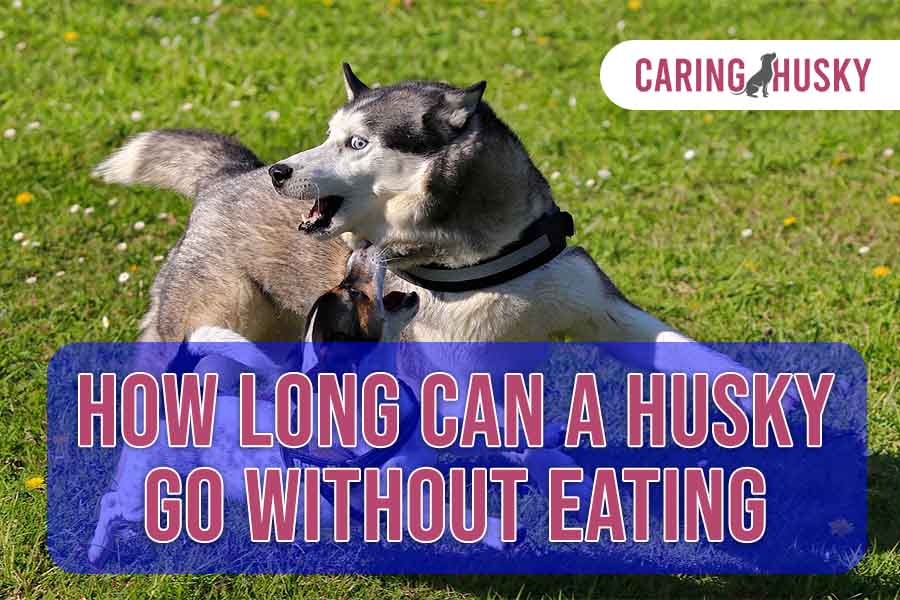
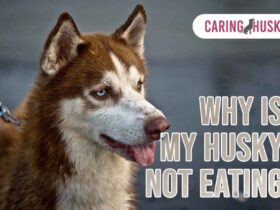
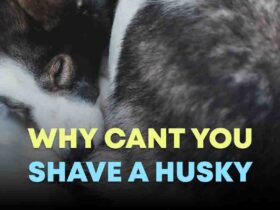
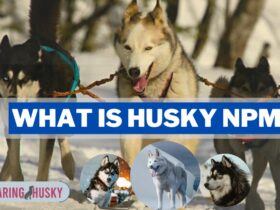

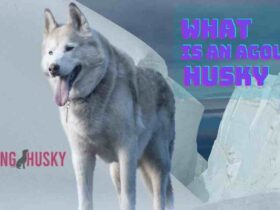
Leave a Reply